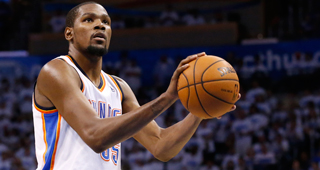When the Oklahoma City Thunder reached The Finals against the Miami Heat in 2012, it seemed as though they were primed for a dominant run at the top of the Western Conference. This was the first true step in their assured ascent. So much has happened to the franchise since then that it seems like far longer than just three years ago.
With Kevin Durant becoming a free agent in 2016, the Thunder are facing their most critical season since relocating to Oklahoma City from Seattle. The roster is starting the season as healthy as they have in years. Yet, despite Oklahoma City reemerging as a title contender after missing the playoffs in 14-15, there is almost as much interest in what happens after this year, as there is in this season itself.
Oklahoma City has patiently put together a terrific roster deep in talent and full of homegrown players. The probable starting five of Kevin Durant, Russell Westbrook, Serge Ibaka, Steven Adams and Andre Roberson were all drafted by the Thunder. No other team can make that claim in the league. Even if they go in a different direction and start Enes Kanter or Dion Waiters, the Thunder are still deeper in players they developed themselves than any other club in the NBA. Because of this, they have been able to retain more high level talent than most other organizations.
When the James Harden trade was made, the prevailing thought around the NBA was that the Thunder wouldn’t pay the luxury tax to keep a title contender fully intact. Over the past year or so, that notion has changed entirely amid the specter of the cap rising significantly in 2016 and 2017.
Oklahoma City cashed in some assets and made moves last season to bring in the aforementioned Kanter and Waiters. This drove their team salary higher than ever before.
The Thunder then matched a four-year, $70 million maximum offer sheet Kanter signed with the Portland Trail Blazers. Oklahoma City is now obviously willing to pay to contend for championships. They paid the luxury tax for the first time during the 14-15 season and will pay it again this season. In addition to being far beyond the tax line, Oklahoma City is also a repeater, so the penalty will be larger than any bill they have previously paid.
The question for the Thunder is whether this is a brief interlude of fiscal assertiveness with the free agencies of Durant, Westbrook and Ibaka looming, or whether this will be their new default trajectory for as long as this core remains title contenders.
One potentially telling indicator is whether the Thunder sign Dion Waiters to an extension before the Nov. 2nd deadline. With a rising cap, a contract starting in the vicinity of $10 million seems reasonable for Waiters. As one of the NBA's most divisive players, that contract could prove difficult to trade in the future if he doesn't fit well with Oklahoma City's core.
The team has also invested heavily in hiring Billy Donovan in as head coach while they also still owe money to Scott Brooks. They are giving Donovan the talent necessary to push the team forward, especially with his more dynamic offense and rotation patterns.
If Durant was to leave in free agency, the impact would obviously be catastrophic. But for Oklahoma City, they would still be deep enough to absorb the loss better than most for at least one season. Westbrook is one of the NBA’s best players in his own right and Ibaka is a rare example of a shotblocker on defense and floor stretcher on offense. The Thunder missed the playoffs with Durant missing most of the 14-15 season, but this team is certainly capable of even winning a playoff series without him if Westbrook and Ibaka are healthy and have enough help from their existing supporting cast.
The challenge of fielding such a deep team is that almost every year you are faced with a decision of giving a big contract to a key component of your squad. These are decisions the Golden State Warriors are currently experiencing with Klay Thompson's extension last year, Draymond Green this summer, Harrison Barnes this year and Stephen Curry in 2017.
The late-era San Antonio Spurs have kept their depth without financial hazard with all of the hometown discounts their core accepted. Durant, Westbrook and Ibaka are all in their mid-twenties and won't be taking discounts until at least they come off their upcoming new deals in their early 30s. Even without the increased investments Oklahoma City has made in rounding out the roster, a core of Durant, Westbrook and Ibaka on post-national TV deal contracts will be a very expensive set of contract obligations for the Thunder.
If the Thunder do re-sign Durant, it is highly likely the team will look basically the same as it does now for the next couple of seasons. Even with a large jump cap jump, the Thunder are unlikely to have the space to make many additions. The Thunder also owe first rounders in 2016 to the 76ers and in 2018 to the Jazz. This is a driving factor in why they matched Kanter and are considering an extension for Waiters. Any improvement will have to come internally or through retaining their players.



